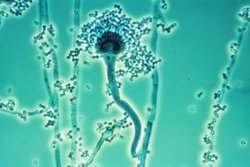- Species
- Tools
- Expression Profiles
- Compare profiles
- Create heatmap
- Export expression levels
- Expression Specificity
- Compare specificities
- Find specific profiles
- Co-expression Networks
- Create custom network
- Find enriched clusters
- Search

Aspergillus fumigatus is a species of fungus in the genus Aspergillus, and is one of the most common Aspergillus species to cause disease in individuals with an immunodeficiency.
Aspergillus fumigatus, a saprotroph widespread in nature, is typically found in soil and decaying organic matter, such as compost heaps, where it plays an essential role in carbon and nitrogen recycling. Colonies of the fungus produce from conidiophores; thousands of minute grey-green conidia (2–3 um) which readily become airborne. For many years, A. fumigatus was thought to only reproduce asexually, as neither mating nor meiosis had ever been observed. In 2008, A. fumigatus was shown to possess a fully functional sexual reproductive cycle, 145 years after its original description by Fresenius. Although A. fumigatus occurs in areas with widely different climates and environments, it displays low genetic variation and a lack of population genetic differentiation on a global scale. Thus, the capability for sex is maintained, though little genetic variation is produced.